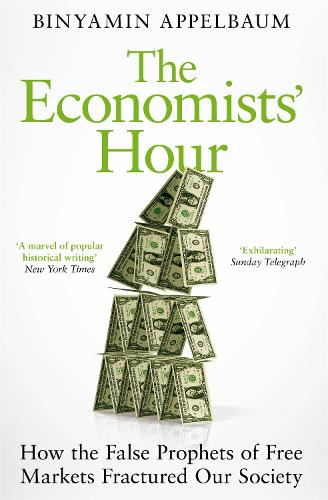
The Economists' Hour: How the False Prophets of Free Markets Fractured Our Society
(Paperback)
Publishing Details
The Economists' Hour: How the False Prophets of Free Markets Fractured Our Society
By (Author) Binyamin Appelbaum
Pan Macmillan
Picador
20th December 2020
3rd September 2020
United Kingdom
Classifications
General
Non Fiction
Economic history
Central / national / federal government policies
330
Physical Properties
Paperback
448
Width 130mm, Height 197mm, Spine 30mm
314g
Description
The Economists' Hour by Binyamin Appelbaum is the biography of a revolution: the story of how economists who believed in the power and the glory of free markets transformed the business of government, the conduct of business and, as a result, the patterns of everyday life. In the four decades between 1969 and 2008, these economists played a leading role in reshaping taxation and public spending and clearing the way for globalization. They reshaped the US government's approach to regulation, assigning a value to human life to determine which rules are worthwhile. Economists even convinced President Nixon to end military conscription. The United States was the epicentre of the intellectual ferment, but the embrace of markets was a global phenomenon, seizing the imagination of politicians in countries including the United Kingdom, Chile and New Zealand. The revolution failed to deliver on its central promise of increased prosperity. In the United States, growth has slowed in every successive decade since the 1960s. And the cost of the failure was steep. Policymakers traded well-paid jobs for low-cost electronics; the loss of work weakened the fabric of society and of democracy. Soaring inequality extends far beyond incomes: life expectancy for less affluent Americans has declined in recent years. And the focus on efficiency has come at the expense of the future: lower taxes instead of education and infrastructure; limited environmental regulation as oceans rise and California burns. This book is a reckoning: the economists' hour is coming to an end, and the world they have left us with feels less predictable than when it began.
Reviews
This thoroughly researched, comprehensive, and critical account of the economic philosophies that have reigned for the past half century powerfully indicts them. * Publisher Weekly (starred) *
A marvel of popular historical writing. * New York Times *
A highly readable, exhilaratingly detailed biographical account. * Sunday Telegraph *
That such sophisticated people presided over a dangerous build-up in financial risk suggests that something larger was at work than a nave faith in markets. Appelbaums strength is that he generally acknowledges these complexities. * Atlantic *
The New York Times financial writer maps the advance of economists - from the Kennedy administration onward - out of the academy and into government, elevating free markets in the sausage - making of public policy and sparking the inequity that plagues us today. * O Magazine *
Lively and entertaining . . . The Economists' Hour is a reminder of the power of ideas to shape the course of history. -- Liaquat Ahamed * New Yorker *
"An entertaining and well-written look at how market-oriented ideas rose from the academy and transformed nations. -- Tyler Cowen
Binyamin Appelbaum has written a powerful must-read for all those interested in reinvigorating the credibility of economics, especially in policymaking circles. -- Mohamed A. El-Erian
Writing in accessible language of thorny fiscal matters, the author ventures into oddly fascinating corners of recent economic history . . . Anyone who wonders why government officials still take the Laffer curve seriously need go no further than this lucid book. * Kirkus *
A well-reported and researched history of the ways in which plucky economists helped rewrite policy in America and Europe and across emerging markets. * Economist *
Author Bio
Binyamin Appelbaum is a Washington correspondent for the New York Times, where he covers the Federal Reserve and other aspects of economic policy. Before joining the Times in 2010, he was a reporter at the Washington Post, the Boston Globe, and the Charlotte Observer, where he was part of a team of reporters nominated for the Pulitzer Prize in 2008 for coverage of the subprime-mortgage crisis.
